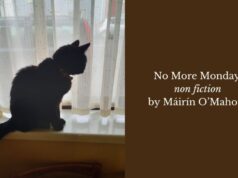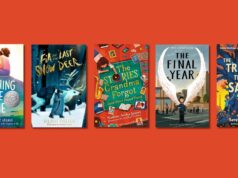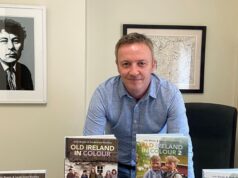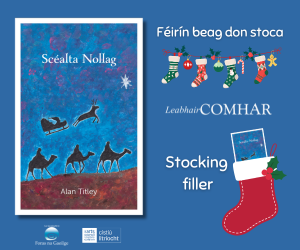Caoimhe Fox talks to Jan Carson about her acclaimed novel The Fire Starters.
‘The Smoke seems to have passed’ announced the waitress delivering coffee to our outdoor table on Drury Street. A plume of smoke was billowing from down the lane, where an apartment had burst into flames as we arrived. The irony of the smoke-filled scene did not escape us as we chuckled gingerly, hoping the vibrant cover of The Fire Starters, on the table between us, didn’t arouse suspicion.
I asked Jan about her own experience of bonfire season growing up in Northern Ireland, given that she is from a rural background. She says that in the country they are quite different—a lot smaller and more of a family event in farmer’s fields. ‘You get together, people sing a little bit. I remember having baked potatoes around the fire once. The ones in the city centre are quite intimidating—they are so big.’
Do the semi-apocalyptic scenes described in the book, with Belfast ablaze and bonfires collapsing into rivers of fire, relate to Jan’s vision of Belfast? She replies that as a magic realist, she is always looking for new spaces, where the other world breaks into real world stuff. She recalls that wandering around Belfast on the Eleventh Night seems unreal. ‘Some of the ideas around symbols, particularly in loyalist culture—the Red hand of Ulster, the giant Lambeg drums, King Billy and his white horse—they are all extreme symbols. There is something intriguing in that; it blurs the line between reality and what we perceive reality to be.’

Jan says that she is intrigued that there haven’t been more hyper-real, other-worldly literature from Belfast. It’s so perfect for that kind of writing: a tradition of legend and myth, religion and symbolism. More interesting is that the bigger, wider literary canon has become less obsessed with boundaries and definitions of what literature is. What might have been perceived as genre fiction is now creeping into literary fiction, she comments. ‘Today I might be a magic realist with the emphasis on magic, and tomorrow I might be a straight-up realist.’
I observe that the female characters in the book are silenced in one way or another: Sammy and his wife Pamela stop speaking to each other while baby Sophie’s voice is under constant threat, and the narrative voice is male throughout. What is the significance of this? Jan says that the idea of voice and silence and particularly the removal of tongues—a really weird subject matter to get into—is a recognised literary trope. But this book is not a misogynistic text, she emphasises. ‘The women are the most balanced, kind characters in the books. Ella Penny, the child with wings, is one of my favourite characters I’ve written.’
Inevitably, Brexit comes into the conversation. Jan was halfway through writing it when the referendum happened and admits it did rock the writing process. ‘There are a number of issues on the table in Belfast now that weren’t there in the ’70s, such as gentrification and migration.’ She believes that in the last twenty years there has been a space for people to be liminal, but a hard border means there’s a line. ‘A line has two sides to it. You have to be on one side or the other. That strange world of the Unfortunate Children, and these people who don’t fit in anywhere but have found community in Belfast, that’s threatened by Brexit.’
There is a lot of dark humour in The Fire Starters, particularly the descriptions of the police and government attempting to deal with the fires. How does humour fit in with Jan’s writing? ‘I did an interview with a Chinese journal a wee while ago, and they said, “It is very interesting because in real life you are actually a very nice, happy person, and your work is so dark!” A lot of writers who tackle dark themes in real life can be reasonably sunny. I love absurdist literature. It’s our natural default position but it took me a long time to learn not to use humour to deflect.’ She says that sometimes it’s OK to laugh at yourself. She lives in East Belfast and admits to being as much a part of the gentrification problem as anybody in the book.
Jan has found that local people say her novel is a recognisable account of East Belfast. ‘The book was mostly written on my feet,’ she says. She spent a lot of time zig-zagging up and down its warren of streets observing people. ‘I don’t want the book to be read as a critique of my community. It’s a homage to the community I live in. I love it. I don’t think it has been celebrated or recorded enough. I tried to position myself as a camera, just saying what I see, not passing commentary on it.’
Jan says that she has been pleasantly shocked to find herself in the community of Irish writers. ‘I had this idea that other writers would be horrible, competitive, mean-minded people. Nice and lovely are the words you use mostly.’ The level of support has been fantastic, particularly from people whose careers began along with her own. ‘When you’re at a book festival and don’t know anyone and you see Lisa McInerney or Danielle McLaughlin coming at you across a room, it’s a real joy. You are amongst friends.’
Does being from Northern Ireland have an advantage or disadvantage for a writer, I wondered. Jan says that the first thing Northern writers face is the idea that you have to write about the Troubles. She admits that this makes her ‘really angry’. It is not all about the Troubles, but ‘you need to write about what is important. You will bring more passion and attention to a subject because you care about it’.
Now that Jan has ‘made it’ as a novelist, I asked her what advice she would give to writers starting out. ‘Enjoy the actual writing. That’s the important thing. All of the other stuff is lovely but can be a distraction.’ She is firm in saying that a writer should get back to their desk and get stories out. She says she’s fortunate in never losing her love of writing. Talking to me is really nice, she says, and she is looking forward to the book launch later, ‘but I had two hours earlier on the Enterprise [train] to write about my dystopian Belfast and that will be the best two hours of my day’.
The Fire Starters won the EU Prize for Literature. What do these accolades mean to Jan? She recognises that when you can put something like the EU prize on your author’s bio, it elevates you. Prizes help increase your audience and are brilliant for making connections with publishers abroad in terms of translation rights. She admits with a smile that the prize money can also be very useful: ‘I have some damp in my back bedroom that needs sorting!’ And is there one prize she’s really like to win? ‘I’d love to have a Man Booker one day.’
Interview by Caoimhe Fox. First published in Books Ireland magazine July/August 2019.












